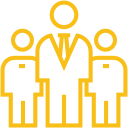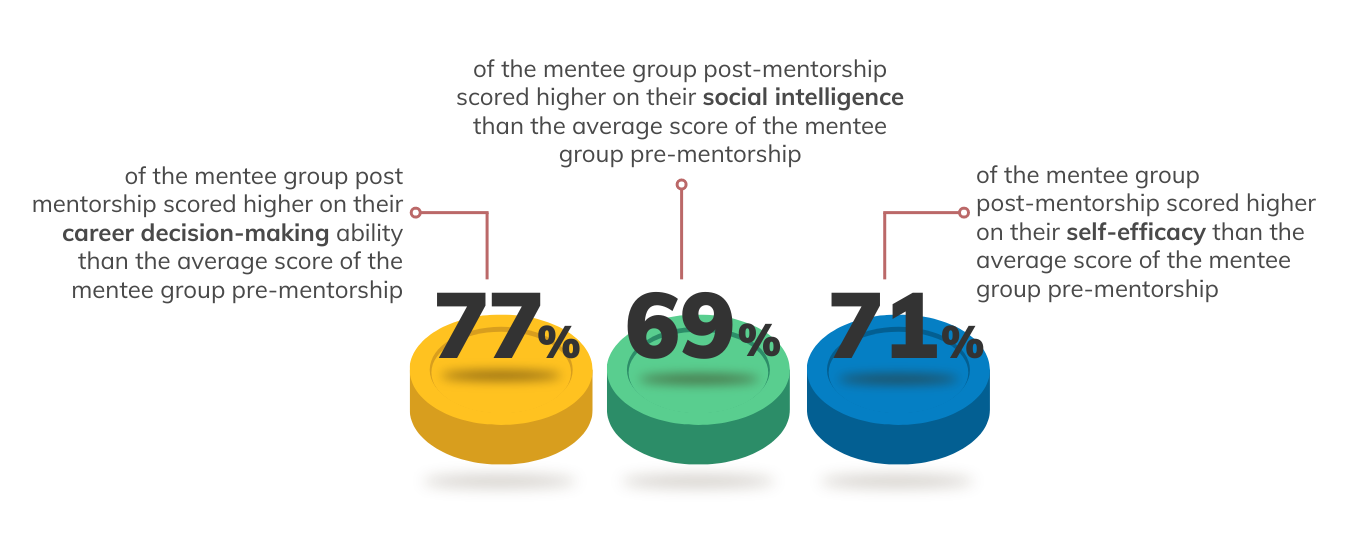
FRAMEWORK OF MENTORSHIP - 4 STAGES AND UNDERLYING SKILLS
Mentoring centers on the creation of a safe and healthy relationship between a mentor and mentee. Our mentoring framework identifies 4 critical stages every mentor and mentee goes through:
CONNECT: Our first relationship stage helps mentor and the mentee establish trust, consistency and reliability in the relationship.By the end of this stage, mentors and mentees feel comfortable around each other.
Empower: In this stage, mentees work on those facets of their lives that they would like to empower through the mentoring. Mentors and mentees practice different life skills that can help them achieve their goals.
Level: In the second stage, we remove implicit and explicit power differences between our mentors and mentees. We establish a mutual or two-way relationship, where mentor and mentee both contribute to the relationship and learn from it.
Evolve: In this final stage, mentees work on their future life choices. Mentors help mentees in their decision-making. Mentors and mentees also reflect on their mentorship and decide the next stage of their own journey.
To help mentors and mentees in their journey to build an empowered relationship we have created a toolkit of 18 different life skills and work skills. Adapting from the UNICEF classification of skills, we’ve uniquely applied these skills to a mentorship context. Mentors and mentees practice them throughout the relationship.
Program Typology
In crowded classrooms and under-resourced communities, there are many children facing unique conditions of family, economic and individual risk. These risk factors if unnoticed and unaddressed can contribute to adverse outcomes like dropout or risky behaviours. Adolescence as a period of development is also a critical inflection point. As children mature, ideas of independence, self-identity, and the practice of autonomy become increasingly important. In our life skills mentoring program, we identify children facing conditions of high-risk, for an intensive 3 year intervention from class 8 to class 10. The goal is to equip the children with life skills to make a successful transition from high school.

13 - 15 years

Govt Schools, Shelter Homes

Community, School, Mentor Together Office

6 - 8 hours per month for a period of 12 months

Life Skills toolkit of 80 hours
Mentor to Go is a technology-enabled mentoring product and program that helps young people in the age group of 18 – 22, primarily from low-income families, access career mentorship across the country, using just their mobile phones or web-devices. As a technology product, Mentor To Go is an Android and Web app that is designed
to allow a mentorship program to be fully remote – in the journey of a mentor and mentee; & in program administration. As a program, Mentor To Go is a national coalition of governments, individual educational institutions, non-profits, and Corporates, across India, that helps students experience virtual career mentorship.

Mentee age group
18 - 22 years

Duration of program
6 months of digital mentoring

Mentee selection
Through partner colleges and NGOs

Mode of mentorship
Digitally via the Mentor To Go app

Mentoring Curriculum
Work skills to improve career decision-making, self-efficacy, career networks, and interpersonal skills

Reach
15000+ mentors and 38800+ mentees from across 12 states
Mentor To Go

Mentee age group
15 - 18 years

Mentee identification
Communities in rural Karnataka predominantly for the pilot

Medium of Mentorship
Phone calls via a customized program app

Duration of program
6 - 8 hours per month for a period of 10 months

Mentoring Curriculum
Life Skills toolkit

For more information
www.mentortogo.org
Foundation for Excellence

Mentee age group
18 - 22 years

Mentee identification
NGO partner - Foundation for Excellence India Trust

Medium of Mentorship
Video calls and phone calls

Duration of program
4 - 6 hours per month for a period of 8 months

Mentoring Curriculum
Work Skills toolkit of 32 hours
Our Impact
Outreach

12
States
3
State Govt. MoUs
38800+
Mentees
15000+
MentorsOur Impact on Mentees
